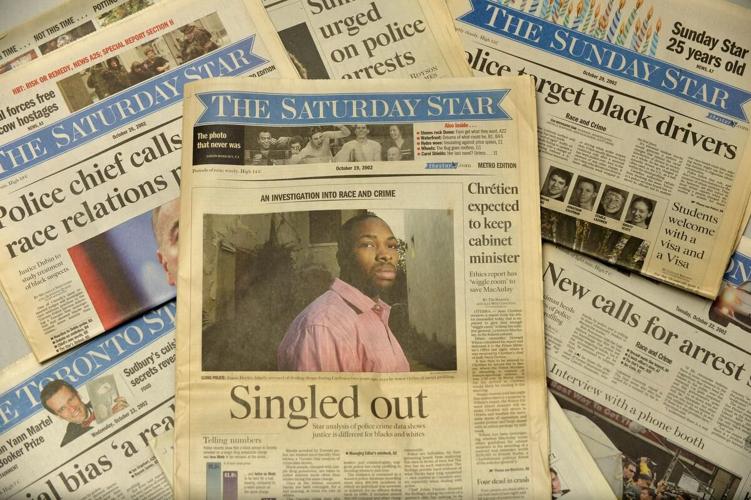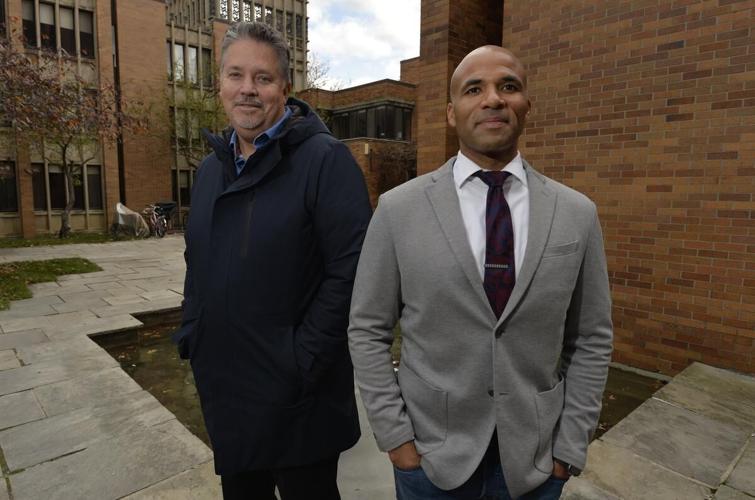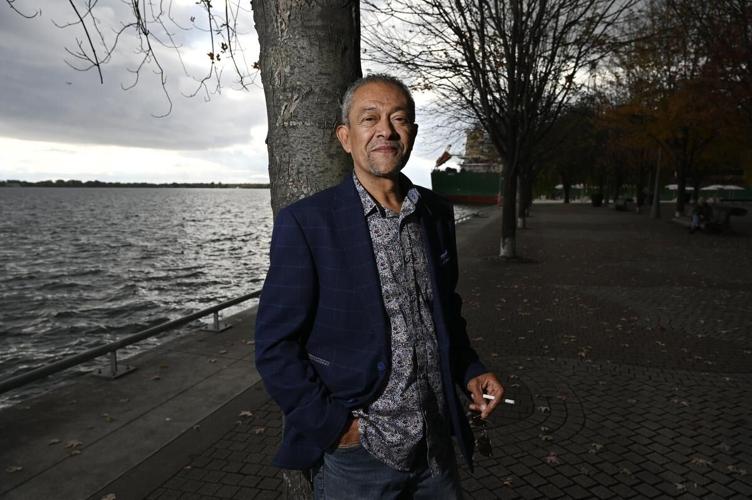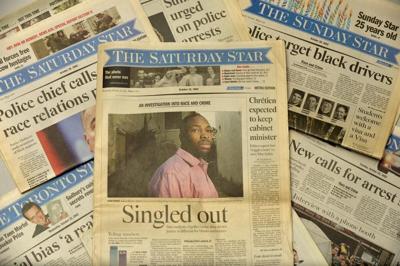Twenty years ago, the Star launched a groundbreaking investigative series into race, policing and crime, which used ¤È§úèÓú½¿ìë½police arrest and charge data to show that Black people were treated more harshly than others.
The series built on decades of research into bias in policing and the justice system in Canada and elsewhere, and on anecdotal stories from Torontoãs Black communities about instances of being stopped while walking or driving, of discriminatory policing and surveillance, of being killed more often during an encounter with police. The series also examined why a disproportionate number of people charged with violent crimes were Black.
None of the data was a revelation to Torontoãs Black communities.
Nor was it last year, when ¤È§úèÓú½¿ìë½police finally issued an apology after their own data confirmed many of the same patterns uncovered by the Star two decades earlier.
But, back then, the reaction from the police, its civilian oversight board and politicians was denial.
The Starãs analysis was dismissed by police-hired experts as ãjunk science.ã The ¤È§úèÓú½¿ìë½Police Association called for a boycott and launched a $2.7 billion lawsuit naming the reporters, editors, data specialists, librarians and management who worked on the series as defendants. The associationãs claim that the series labelled all members of the police service as racist failed at every level of court, right up to the Supreme Court of Canada.
I was one of five reporters named in the lawsuit. Privately, we mused that had we lost, the police association would take over as the Starãs publisher.
Today, after years of followup investigations into racial disparities in police arrests and charges, the practice of carding, school suspensions, the child protection system, COVID vaccine rollouts and more, the conversation across the country has changed.
Denial is a thing of the past. Politicians and leaders in many sectors now offer apologies. Race-based data, once verboten, is sought-after in nearly every sector of Canadian society ã because you simply canãt measure change without benchmarks.
Still, the disparities persist across the board, for Black, racialized and Indigenous people.
In policing, the most recent data confirms Black people are more likely to have force used on them, and more likely to be killed.
The anniversary of the Starãs series late last year provided a reason to reflect, assess whatãs changed and what has not, and look at what needs to be done to address systemic racial disparities ã not just in policing.
There are perhaps no better people to hear from than those who were impacted the most by the series, who spoke out and continue to speak up, who studied the issues, and one who wore the uniform and pushed for change.
A legacy project

Jason Burke, falsely accused of dealing drugs by ¤È§úèÓú½¿ìë½police more than 20 years ago, was the front-page face of the ¤È§úèÓú½¿ìë½Star’s 2002 series into policing, race and crime. Burke sued police, alleging he was the victim of racial profiling.
Jim RankinJason Burkeãs portrait appeared on the front page of the Saturday Star on Oct. 19, 2002, above a two-word headline: ãSingled out.ã It was the first of the Star stories, which found Black people arrested for simple possession of cannabis were less likely to be released at the scene and more likely to be held for bail than white people. The series also found that Black motorists were disproportionately slapped with driving offences that could only come to police attention following a stop for other reasons ã offences such as failing to update a driverãs licence or driving without insurance.
Burke, then 28 and working as a buyer in the fashion industry, was suing ¤È§úèÓú½¿ìë½police, alleging he was racially profiled during the Caribana festival in 1999, when police had wrongly taken him for a drug dealer. Heãd been pushed to the ground, pepper sprayed and held for three days. No drugs were found and charges were later dropped.
ãI donãt think a day will come, in my lifetime, when I wonãt be profiled or identified for who I am, and what I am,ã Burke said at the time.
On a rainy afternoon last fall, Burke steps into a Liberty Village coffee shop looking as stylish as he did 20 years earlier. Instead of the pink cotton dress shirt he donned for the portrait ã made by Ralph Lauren, still his favourite designer ã heãs in a grey wool coat with a black Champion hoodie beneath, black Nike ball cap and kicks.
Weãve kept in touch over the years. He married the woman he was out with the night of his arrest and had a boy and a girl ã now 12 and 13. He got a divorce, is completing a Masterãs in inclusive design, is still plugged into the sports, fashion and hip-hop scenes, runs a sports/lifestyle business he named , and is a part-time soccer and hockey coach.
He is still contemplating how he can support Black communities, as his parents, Sam and Rita, have done with their lives, in part through ãI Like Being Me,ã a childrenãs book they wrote, and their .
ãIãm alive today because of my parents,ã says Burke, now 48. When he landed in jail after the 1999 encounter, his parents knew just who to call ã Michael Tulloch, who later became the first Black judge appointed to the Ontario Court of Appeal ã and that ultimately led to lawyer Julian Falconer taking up his case.
The lawsuit ended in a settlement, which came with a condition that Burke canãt talk about it, as is typical.
Plenty else to talk about, though, like the impact of Drake on ¤È§úèÓú½¿ìë½culture ã ãheãs created an opportunity for everybody who looks like us in this country to get onã ã and Masai Ujiri on sports and the community ã ãwe cannot have this conversation without talking about Masai!ã
But most impactful, the 2020 murder of George Floyd, for which a Minneapolis cop was charged and convicted. It invigorated his parents to take their once physical bookstore online and gave Burke, who is helping them, more focus.
ãMy parents have been like, ãHey, itãs time to go, we gotta go again,ãã says Burke. ãItãs an incredible opportunity for me to bring all the work that my parents have done for the last 25 years to life again, in real-time now, thatãs pretty exciting. Itãs a legacy project.ã
The professor and the student

University of ¤È§úèÓú½¿ìë½professors Scot Wortley and Akwasi Owusu-Bempah, at Massey College. The two have extensively studied racial bias in policing.
Jim RankinFor University of ¤È§úèÓú½¿ìë½criminologist Scot Wortley, the Starãs findings bolstered existing academic research ã including his own at the time of the series ã into racial disparities in the justice system. For Akwasi Owusu-Bempah, who at the time was a criminology student, the journalism was revelatory and changed the path of his career. Instead of seeking to become a cop, Owusu-Bempah decided heãd ãwork on and address issues that the stories brought to lightã ã as an academic.
ãFor me, the most powerful piece of that reporting was demonstrating just how systematic and broad a problem racism in policing was, and I will say continues to be,ã says Owusu-Bempah, now a professor in the sociology department at U of T. ãIt brought racial profiling into the public consciousness in Canada.ã
What has changed is the narrative coming from the police themselves, from denials to ã mostly ã acknowledgments, says Owusu-Bempah, who still often collaborates with Wortley. The duo are at the forefront of research on perceptions of police and racial disparities in the justice system, and are sought-after by law enforcement institutions wanting to tackle inequity within their own ranks.
Wortley was the lead researcher in the Ontario Human Rights Commissionãs yet-to-be-completed inquiry into racial bias by ¤È§úèÓú½¿ìë½police, the most recent component of which delved into the . Data gleaned from Ontarioãs Special Investigations Unit, from 2013 to 2017, showed Black people were nearly 20 times more likely to be shot dead than a white person in Toronto, and six times more likely to be taken down by a police dog.
That report was made public months after Floyd was killed, and as racial reckonings were reverberating around the world.
ãI do think thereãs probably been more movement in the last two years on the policy front than there had been in the previous 25,ã says Wortley ãI mean meaningful policy changes, particularly related to the collection and dissemination of race-based data, in health care, education, the employment sector, housing, thereãs so many related social sectors that mutually influence each other.
ãEventually, I hope that silos can be broken down, and there can be systemic collection of this data across the systems so we can see how something happening in the criminal justice field may impact whatãs happening in education, or vice versa.ã
A lifeãs work

Frances Henry, professor emerita from York University, is one of Canada’s leading academic experts in the fields of racism and anti-racism. She co-authored a book with colleague Carol Tator, Racial Profiling: Challenging the Myth of a Few Bad Apples, in 2006. Part of the book looked at the impact of the ¤È§úèÓú½¿ìë½Star’s 2002 series on race, policing and crime.
Jim RankinFrances Henry and research collaborator Carol Tator, both at York University when the Star series was published, soon after wrote ãRacial profiling in Canada: Challenging the Myth of ãA Few Bad Apples,ãã a book that, in large part, focused on the series and its fallout.
Responses to the series from ãthe white public authorities offer critical insights into the way in which racialized discourse is used to deny and deflect attention away from the general issue of racism in policing, and more specifically, the highly contested issue of racial profiling of Blacks,ã wrote the pair.
This fall, Henry was awarded the Order of Canada for ãvisionary researchã that has had a ãfundamental impact on Canadaãs public policies, notably in the areas of employment equity, policing and immigration.ã And a lifeãs work that ãhas laid the foundation for generations of scholars in the field of anti-racism.ã
Retired from York, but still working, Henry is looking at diversity, equity and inclusion efforts, particularly in universities. It is not always pretty, similar to what has happened in other settings for decades. Well-meaning institutions often seek help from experts who may not be all that expert, says Henry.
ãJust because an individual is a member of a disadvantaged group does not necessarily mean that he or she has the expertise to teach others or to train others,ã she says. ãPeople are earning big dollars as a result. But nothing much is really, really happening.ã
The upshot: A lack of structural change in institutions like universities has spawned ãa lot of hostilityã from equity-deserving groups that, in some cases, turn to ãradicalã approaches in their criticism of the slowness of it all, Henry says. Itãs a process that can lead people to feel the only solution is to, ãpull the whole thing down and start all over again.ã
She says she also sees academic colleagues who are placed in higher positions to affect change but are given no power to do so. ãMany of them have gone or left or have been so defeated due to their lack of power that theyãre not in the picture as such.ã That, Henry says, ãis worth doing some research on.ã
What do I tell my children?

Barry Thomas was a consultant with the Urban Alliance on Race Relations when the Star published its 2002 series into race, policing and crime. He is now with the ¤È§úèÓú½¿ìë½Community Housing Corporation.
Jim RankinTwenty years back, Barry Thomas ã after stints as executive director of Tropicana Community Services and heading up the Canadian Centre for Police-Race Relations ã was a consultant with the Urban Alliance on Race Relations.
A landmark Ontario Superior Court of Justice decision involving Dee Brown, a former NBA player with the ¤È§úèÓú½¿ìë½Raptors, had recently come down, with a judge finding a lower court judge failed to properly consider that Brown was racially profiled in a 1999 traffic stop in Toronto. The decision was upheld on appeal, with the Ontario Court of Appeal becoming the first appellate court in Canada ã the first to acknowledge that some police target racial minorities believing they are more likely to commit crimes.
Thomas, who emigrated from South Africa to ãget away from racism and the apartheid system,ã saw the Brown decision as a watershed moment.
ãIt factually proved all the hearsay and second-hand information that Canadian Blacks ã from the , from the , the , ã all talked about for 25, 30 years before people like me came on the scene,ã says Thomas, rhyming off some of the stalwart social justice advocates.
Thomas spoke to the Star for the 2002 series about the reality of racism in policing, and of punishment within the police culture for calling it out. In certain circles, Thomas was given the cold shoulder for saying what he said. And things didnãt change enough because of the Brown decision. It took a personal toll.
ãThe body politic, and people like myself, had had enough of talking about ourselves to the extent that we needed counselling,ã says Thomas. ãI opted, because this is who I am, not to go to counselling, but to stop doing anti-Black racism work for my own sanity.ã
Thomas shifted his career to the ¤È§úèÓú½¿ìë½Community Housing Corporation, where has been for the past 19 years. In the years between, heãs seen his son racially profiled by police, the death of Floyd, an overdue focus on Indigenous restitution, a ãFreedom Convoyã of ãwhite truckersã getting attention, and also watched his level of frustration grow.
Other equity-deserving groups, such as the LGBTQ+ community, the womenãs rights movement and even the anti-smoking lobby have made better progress than the fight to end anti-Black racism, often using the same strategies and ãnomenclature,ã says Thomas. He said finds himself sometimes ãresentful about the hard, deep intellectual and academic and empirical work that Iãve engaged in, and weãve engaged in.ã
ãI wonder, what else do we need to do?ã he says. ãOnce more, the (fight against) anti-Black racism is going to sleep.ã
Now at the end of his career, he thinks of the choice to come to Canada so his children can have a better life, and finds himself ãlooking for the facts to prove my case, and Iãm not finding it.
ãWhat do I tell my children?ã he says. ãIãm pessimistic on one hand, but what made me survive and what made my family and South Africans like me survive was that we always come back to the hope and the love in our humanity.ã
The cop who would be chief

Peter Sloly was a staff inspector in charge of the ¤È§úèÓú½¿ìë½Police Service corporate communications unit in 2002 when the ¤È§úèÓú½¿ìë½Star series on race, policing and crime was published.
Jim RankinBefore he became a Black chief of police in Ottawa and resigned amid a convergence of trucks and occupiers with a myriad of pandemic-related grievances, before he seemed destined to become a change-making chief in ¤È§úèÓú½¿ìë½but was passed over, Peter Sloly was, in 2002, a newly appointed head of corporate communications for the ¤È§úèÓú½¿ìë½Police Service.
Just back from a UN peacekeeping tour and in the rank of staff inspector, Sloly was informed by Star reporters of the nature of the analysis the paper had done and a need for an interview with then-Chief Julian Fantino.
The interview took place in a 7th-floor boardroom at police headquarters and ended after about 20 minutes when an angry, defensive Fantino ã calling the interview an ambush ã concluded with this line: ãGive yourselves a shake, people. I tell you itãll be a long time before you dignify my office.ã
For Sloly, the series represented ãan important piece of journalism on a very important topic to a lot of people. And specifically, people in communities that receive disproportionately the largest amount of policing attention, policing services, good bad or indifferent, and therefore needs to be taken seriously, and supported as much as possible from all stakeholders to try to arrive at a better public good outcome, better public service, in this case, a better policing service.ã
He does still take issue with some specific interpretations in the series and points to the still-evolving area of race-based data analysis but says, ãas a result of the series of journalistic efforts by (the Star) and many others since you, I think a lot of issues have been redressed significantly.ã
Since 2002 and subsequent Star examinations of carding ã or street checks ã data, Sloly points to ãsome really groundbreaking efforts,ã but he also points to ãdefault mental constructsã he believes are getting in the way of more meaningful change.
The core problem is not a need to ãfixã the front-line officer, he says. ãI think unfortunately, front-line officers ã white, Black or brown men and women ã have borne the brunt of the publicãs displeasure around this when they themselves were victims of a system that did not adequately support them.ã
Rather, itãs the ãsystemic issues in the system that I think the Star stories covered ã this stake in poorly constructed performance management programs, mistaken and poorly designed systems that counted outputs, rather than looking at outcomes, incentives for promotions and transfers, probably a lack of leadership and leadership development, and definitely a lack of truly developing individuals in every part of the organization.ã
A second ãimperfectã situation, he says, is in leadership and senior levels.
ãIt was actually easier to make changes 20 years ago, itãs actually more difficult to make change now, for a host of reasons. The world didnãt move that fast in 2002. It moves at the speed of constant light, in 2022,ã Sloly says.
There is pressure, he says, on leaders to just do a basic job without ãsubstantive resourcesã and an ãincreasing spotlight ãÎ means that people are less brave, less courageous, less willing to take the risks necessary for big changes.ã
A ãfierce, urgentã need for change, coupled with an ãexponentially lower level of good conversation, good consultationã with ãpeople leaning in from the outsideã in the community is creating friction and ãcynicism,ã Sloly says
ãWeãre missing each other now and that is a very unfortunate situation. Iãm not sure what the answer for that is, except people just canãt give up.ã
The beat goes on

Zanana Akande, former teacher, principal and MPP, was president of the Urban Alliance on Race Relations in 2002, when the ¤È§úèÓú½¿ìë½Star series on race, crime and policing was published.
Jim RankinZanana Akande was president of the Urban Alliance on Race Relations in 2002, and the former teacher, principal, and first Black female member of the Ontario Legislature, was one of many voices in Torontoãs Black communities to say the time for yet another inquiry or commission into police race relations ã as then police chief Fantino had ordered up in response to the Star series ã was over.
Akande called that offer another ãstall.ã When the police hired experts to dispute the Starãs findings and, unannounced, shared them at a public meeting, Akande urged police to instead focus on the community experience that racial profiling exists.
Then as now, there is no dispute that it does. The difference, Akande notes: ãI think the apologies have increased, and Iãm not saying that with any great pride.
ãIãm saying that sometimes it seems that the apologies for the accusations are out there and planned even before the accusations are made. Thereãs still many people stopped. And thereãs still a great deal of evidence of racial profiling, especially for youth.ã
The institutional acceptance ã in policing and other institutions ã that racial profiling is real but not necessarily shocking, is problematic, Akande says.
ãI think that that acceptance brings too much comfort towards not changing it,ã she says, leading to an attitude that racism is ãa reality of our lives, in Toronto, or in Canada, and get used to it. But the apologyãs there.ã
Still: ãThe beat goes on, as the song says.ã
Akande is frustrated by all of it, especially when she thinks of her eight grandchildren.
ãThey come up against situations and theyãre wide-eyed, and theyãre a little more informed than I would hope they would have to be, but they have to be,ã Akande says. ãWhen can they just be a 12-year-old? Is there ever going to be a generation when they can just meld in with their colleagues and their classmates and not have to worry about being negatively identified by their race?ã
Hope is still there for Akande, and she lives by advice she is willing to share: As one does in choosing friends, ãomit the idiots.ã


































To join the conversation set a first and last name in your user profile.
Sign in or register for free to join the Conversation